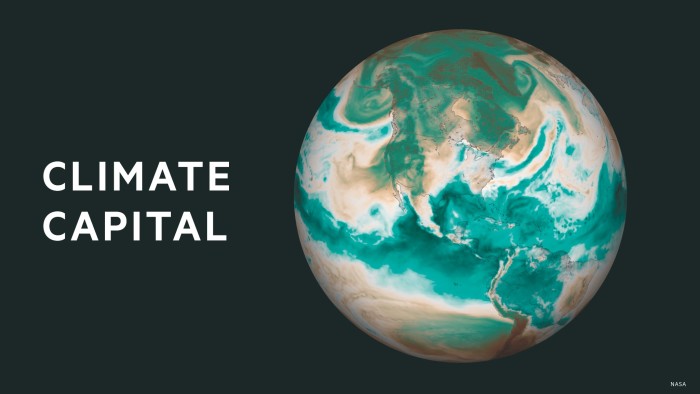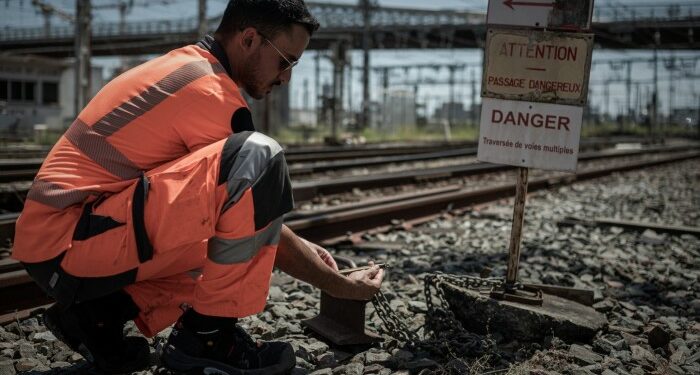Simply sign up to the Climate change myFT Digest — delivered directly to your inbox.
Railways and electricity grids across Europe may be “stress tested” for hot weather under plans being drawn up by the EU to prepare critical infrastructure for the demands of a warming planet.
The stress testing would be part of a broader policy, due to be presented next year, to respond to the growing number of disasters expected as a result of climate change, said three EU officials with knowledge of the proposal.
Brussels is weighing whether to require EU governments “to do stress testing across energy, health [etc] for a four-degree warmer scenario”, a senior EU official said. “It’s something we believe would be a sensible effort from member states.”
Another official described the move as a “no brainer” that should, if enacted, prompt more resilient infrastructure to be built and “further debate about what needs to be done”.
Temperatures in Europe are expected to increase at least 3C by 2050 compared with pre-industrial levels, according to assessments by the European Environment Agency.
The EEA in March said Europe faced high risks of “heatwaves and prolonged droughts”, even at marginally higher temperatures. “This can lead to acute crises, such as widespread wildfires, critical infrastructure failures, blackouts, and major health and economic impacts,” it said.
The EU has suffered billions of euros worth of damage in the past two years from significant forest fires and floods. Floods in Slovenia in 2023 were estimated to have cost the country 16 per cent of its GDP.
“It is a good question for what the kind of extremes we should start to prepare, especially if we have this more longer-term perspective,” said Leena Ylä-Mononen, executive director of the EEA, told the Financial Times. “We are talking about infrastructure or really major industrial installations — they are meant to last for decades.”
She added whether stress testing against a 3C warmer scenario should be “explored” as that would “already have devastating impacts in Europe”.
France is the first member state to have started stress testing nationally. In October it opened consultations on a plan to look at how critical infrastructure fared if temperatures were 4C higher.
In the 2015 Paris climate agreement, countries agreed to limit global temperature rises to well below 2C and ideally to 1.5C above pre-industrial levels.
The global average temperature is expected to surpass 1.5C above pre-industrial levels for an annual year for the first time this year. This is distinct from the Paris agreement target, which is measured over decades rather than in a single year.
Recommended
Europe is warming faster than other continents because of its geography and surrounding ocean currents.
“What is clear is that whatever scenario for the globe is assumed there has to be an add-on applied [in Europe] because the effects are expected to be worse here than anywhere else,” an EU official said.
Concerns around the readiness of EU countries for the effects of climate change were exemplified in November when devastating floods hit the Spanish region of Valencia, killing at least 231 people.
Other elements of the EU plan are likely to include strengthening early warning systems and providing a framework to provide incentives to private investment into projects to improve the bloc’s resilience against extreme weather.
Additional reporting by Attracta Mooney in London
Climate Capital
Where climate change meets business, markets and politics. Explore the FT’s coverage here.
Are you curious about the FT’s environmental sustainability commitments? Find out more about our science-based targets here
Source link : http://www.bing.com/news/apiclick.aspx?ref=FexRss&aid=&tid=677270b1e7b042b1ac6bc6fc67796d76&url=https%3A%2F%2Fwww.ft.com%2Fcontent%2F65b0ab93-51da-450f-ae11-bcb92d1e7b14&c=15046460834593933078&mkt=de-de
Author :
Publish date : 2024-12-29 21:00:00
Copyright for syndicated content belongs to the linked Source.


